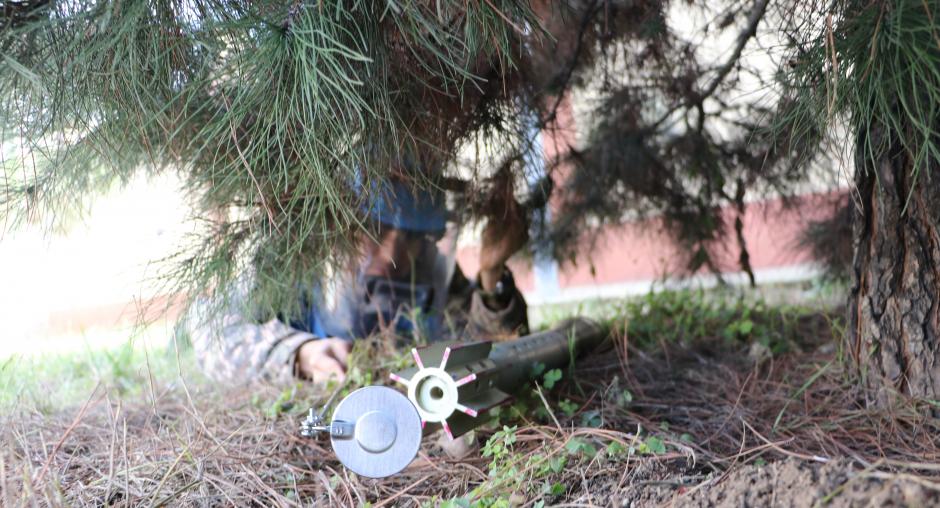OSCE concludes Explosive Ordnance Disposal Level 3 course for specialists from Central Asia and Serbia

On 23 February 2024, eighteen mine action specialists and practitioners from the military, law enforcement, security services, and humanitarian agencies of Kazakhstan, Tajikistan, Turkmenistan, Uzbekistan, and Serbia completed a three-week regional Explosive Ordnance Disposal course (EOD Level 3) at the Regional Explosive Hazards Training Centre of Tajikistan’s Ministry of Defense in Chimteppa.
During the EOD Level 3 course participants enhanced their skills in conducting render-safe procedures, demolitions up to 50 kg net explosive quantity on a wide range of specific types of explosive ordnance on which they have been trained, tape and line, dearmer, and rocket wrench techniques through a series of theoretical classes and practical exercises.
The closing ceremony at the National Library of Tajikistan in Dushanbe was attended by high-level representatives of the OSCE Programme Office in Dushanbe, Tajikistan’s Ministry of Defense, Tajikistan National Mine Action Centre, the U.S. Embassy in Tajikistan, and the United States Army Central.
Carrie Lee, the Deputy Chief of Mission at the U.S. Embassy in Dushanbe, warmly welcomed graduates from across Central Asia and highlighted that their participation reflects the collective commitment to eradicating the dangers of unexploded ordnance and bringing safety and hope to communities throughout the region.
David Silva, Command Sergeant Major of the 20th Chemical, Biological, Radiological, Nuclear, and high-yield Explosives Command, emphasized the ongoing partnerships between U.S. Army Central, U.S. Central Command, and the Tajikistan Ministry of Defense EOD forces. The collaborations, including Subject Matter Expert Exchanges and Humanitarian Mine Action engagements, have demonstrated the Tajikistan EOD forces' outstanding knowledge and technical proficiency in utilizing specialized tools and robotics platforms.
Major General Sayorabek Bachabekzoda, Head of the Department of Engineering Troops of the General Staff of the Armed Forces of the Republic of Tajikistan highlighted the importance and relevance of explosive hazards for the region, particularly in Tajikistan. He stressed the importance of concerted efforts in mitigating these risks and working towards a safer environment for the population.
Major-General Muhabbat Ibrohimzoda, Director of the Tajikistan National Mine Action Centre, contributed to the dialogue by providing insights and perspectives on mine action-related initiatives.
Ihar Kuzminich, Head of Countering Security Threats and Regional Cooperation Unit of the OSCE Programme Office in Dushanbe, emphasized that the joint activities are in line with the OSCE's wider mandate and the 2017 Memorandum of Understanding with the Tajik Ministry of Defense. These activities foster political dialogue, mobilize relevant actors, and develop a platform for joint action to address security issues in Central Asia.
The project aligns with the broader role of the OSCE with a focus on the crucial area of humanitarian mine action, aiming to make a lasting difference in addressing the risks and impacts of landmines and explosive remnants of war. By fostering collaboration and leveraging collective efforts, the project contributes to enhancing safety, promoting stability, and improving the lives of communities affected by explosive hazards in the region.
